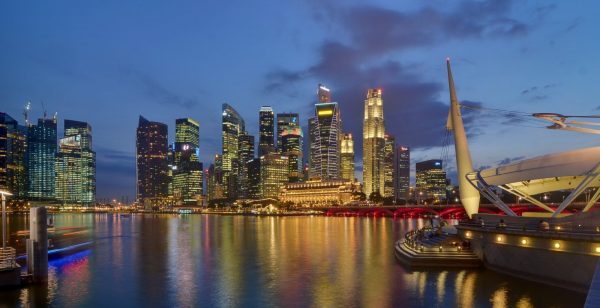Singapore-based data firm Keppel Data Centres announced signing of a MoU with Toll Group to study the feasibility of developing a first-of-its-kind Floating Data Centre Park (FDCP) in Singapore.
Under the agreement, the two companies will explore the development of a near-shore FDCP at the Loyang Offshore Supply Base, which is operated by Melbourne-based Toll Group.
The FDCP is envisioned to optimise energy usage by integrating LNG and possibly hydrogen infrastructure for onsite power generation. This would also eliminate reliance on the national grid.
In particular, under a separate MoU with Royal Vopak, the company will conduct a feasibility study and assess the commercial viability of establishing LNG-to-power infrastructure and possibly hydrogen infrastructure for the power and cooling plants, which will form part of the FDCP development at Loyang Offshore Supply Base.
The adjacent LNG and possibly hydrogen infrastructure will potentially allow FDCPs to tap on cold energy generated from LNG regasification to supplement the cooling load.
With the growing global demand for data centres, Keppel Data Centres sees the FDCP concept as an environmentally-friendly way to meet the expanding needs of the digital economy.
Data centres consume significant amounts of energy for cooling purposes, especially in the tropics.
However, a floating data centre utilises seawater for cooling, thus being much more energy efficient than conventional land-based data centres.
It also avoids the use of potable or industrial water in cooling towers, which typically results in significant water loss through evaporation.
In addition, FDCPs free up valuable land for other urban uses, making it a particularly attractive proposition for land-scarce cities.
Fabrication of floating data centres can be done quickly and cost effectively in controlled environments such as Keppel Offshore & Marine’s yards and deployed in a ‘plug-and- play’ manner. This greatly reduces the construction-related carbon footprint of data centres, as well as the development costs and speed to market.
…explained Mr Wong Wai Meng, CEO, Keppel Data Centres.
Given the modular design, new floating data centre modules can be readily developed and deployed to replace the older ones, while the older floating data centre modules can be recycled for deployment in other locations, thus contributing to the circular economy,

































































